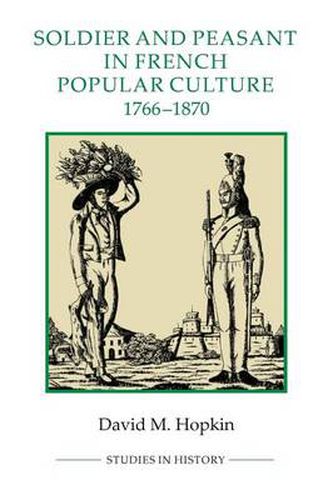Readings Newsletter
Become a Readings Member to make your shopping experience even easier.
Sign in or sign up for free!
You’re not far away from qualifying for FREE standard shipping within Australia
You’ve qualified for FREE standard shipping within Australia
The cart is loading…






Revolutionary France gave the modern world the concept of the nation-in-arms , a potent combination of nationalism, militarism and republicanism embodied in the figure of the conscript. But it was not a concept shared by those most affected by conscription, the peasantry, who regarded the soldier as representative of an entirely different way of life. Concentrating on the militarised borderlands of eastern France, this book examines the disjuncture between the patriotic expectations of elites and the sentiments expressed in popular songs, folktales and imagery. Hopkin follows the soldier through his life-cycle to show how the peasant recruit was separated from his previous life and re-educated in military mores; and he demonstrates how the state-sponsored rituals of conscription and the popular imagery aimed at adolescent males portrayed the army as a place where young men could indulge in adventure far from parental and communal restraints. The popular idea of moustachioed military folk-heroes contributed more to the process of turning peasants into Frenchmen than the mythology of the nation-in-arms .
WINNER OF THE 2002 RHS GLADSTONE PRIZE.
David M. Hopkin is tutor and fellow in history at Hertford College, Oxford University.
$9.00 standard shipping within Australia
FREE standard shipping within Australia for orders over $100.00
Express & International shipping calculated at checkout
Revolutionary France gave the modern world the concept of the nation-in-arms , a potent combination of nationalism, militarism and republicanism embodied in the figure of the conscript. But it was not a concept shared by those most affected by conscription, the peasantry, who regarded the soldier as representative of an entirely different way of life. Concentrating on the militarised borderlands of eastern France, this book examines the disjuncture between the patriotic expectations of elites and the sentiments expressed in popular songs, folktales and imagery. Hopkin follows the soldier through his life-cycle to show how the peasant recruit was separated from his previous life and re-educated in military mores; and he demonstrates how the state-sponsored rituals of conscription and the popular imagery aimed at adolescent males portrayed the army as a place where young men could indulge in adventure far from parental and communal restraints. The popular idea of moustachioed military folk-heroes contributed more to the process of turning peasants into Frenchmen than the mythology of the nation-in-arms .
WINNER OF THE 2002 RHS GLADSTONE PRIZE.
David M. Hopkin is tutor and fellow in history at Hertford College, Oxford University.